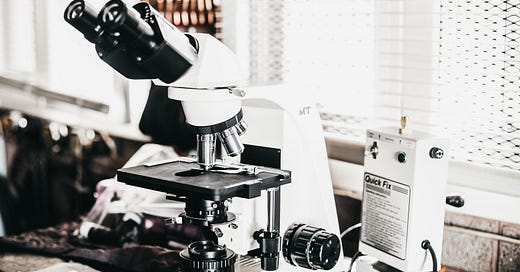Med AI's Game-Changing Impact: Breakthroughs in Cancer Diagnosis, Disease Understanding, Streamlined Patient Care, and More 🌟🏥
Weekly Updates on AI in Medicine 🤖🩺🚀
"As more and more artificial intelligence is entering into the world, more and more emotional intelligence must enter into leadership." -- Amit Ray, Famous AI Scientist, Author of Compassionate Artificial Intelligence
Dear Med AI Enthusiast,
Welcome to this edition of ‘The Med AI Capsule’ Weekly Newsletter! ⚕️🤖💊 I'm really excited to have you with me as we dive into the fascinating world of Medical AI.
In this newsletter, I'll be your guide, taking you through the latest news updates and thought-provoking ideas in the ever-changing field of artificial intelligence in medicine.
Whether you're an interested medical professional, a tech enthusiast, or just curious about the future of medicine, 'The Med AI Capsule' is here to lead the way and show you the exciting possibilities and cautionary areas for AI in medicine.
So, get ready for an adventure, and let's explore this thrilling journey together!
In today’s capsule:
5 Med AI News Updates
3 Med AI Research Updates
2 Med AI Events
1 Med AI Work Opportunity
Social Post of the Week
Reading Time: 5-7 minutes
Med AI News Updates 📰
Google and the Department of Defense have collaborated on the Augmented Reality Microscope (ARM) to aid in cancer diagnosis.
ARM aims to swiftly detect and assess cancer, particularly beneficial for understaffed labs, but thorough testing is required before clinical use.
This accelerates disease diagnosis and treatment development by aiding researchers in identifying disease-related mutations. However, AlphaMissense should complement other evidence, and its predictions are not yet suitable for direct clinical application.
This assists clinicians in accessing patient data through voice commands, enhancing patient care experiences. However, its complete implementation is planned over the next year, and it should be complemented with other medical knowledge sources for comprehensive patient care.
This initiative, with a focus on human cells and diseases, aims to accelerate disease research by incorporating generative AI and leveraging openly available AI models and datasets. While promising, the initiative should also be approached with caution, considering ethical and human expertise factors.
This technology promises to improve patient care, streamline workflows, and contribute to healthcare excellence in line with national priorities. However, careful consideration must be given to data privacy, security, and the potential challenges of over-reliance on AI in healthcare decision-making.
Sponsor’s Corner 📢

Med AI Research Updates 🔬

The paper introduces ML-PLIC, a web platform that helps scientists study how proteins and molecules interact, making it easier to find potential treatments for diseases.
It's great because it's more accurate than other tools and can speed up the search for new medicines.However, we should remember that it's not a magic solution, and real-world testing is still crucial for drug discovery.
This paper investigates individuals' willingness to share images for artificial intelligence (AI) use in dermatology, considering variables that influence their decision.
The study found that people are more comfortable sharing pictures of their hands and faces than genitals for AI use, especially for medical care. However, some people still refuse to share images, even with compensation, suggesting privacy concerns should be considered.
Researchers developed an AI model to predict the survival of lung cancer patients after surgery using factors like blood tests.
The model was really accurate, suggesting it could help doctors make better decisions about patient care. However, it's important to remember that AI models are tools and should always be used alongside a doctor's expertise and other medical information.
Med AI Events 🧑💻
Med AI Work Opportunity 💼
Social Post of the Week 📲
Let’s wrap it up with a historical fun fact!
Alan Turing proposed a theoretical way to test whether a machine was truly "intelligent." In a game he called the "imitation game," an interrogator asked questions to a machine and a human in separate rooms, not knowing which was which. If the computer could successfully trick the interrogator into believing it was the human, it was, Turing argued, "intelligent." (Reference)
Stay tuned for our upcoming editions as we explore the latest breakthroughs and dive deep into AI's transformative power, shaping a healthier future.
Warm regards,
P.S.: If you're a medical professional intrigued by artificial intelligence, but not sure where to start, feel free to reach out to me for personalised guidance HERE.
You can also check out my CPD-accredited Med AI course on the Bionabu (UK) platform and join our vibrant Med AI WhatsApp Community.
Follow me on LinkedIn and Twitter
Voluntary Disclosure: Generative AI tools were employed to help me in making this newsletter better for you.










Thank you for sharing 😊👍